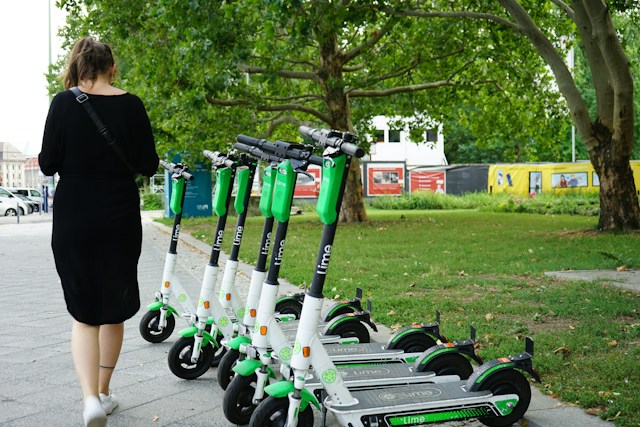As the sun rises over the urban landscape, the city streets buzz to life. Daily, you witness a growing trend – a sea of people zipping past on their electric scooters. They are effortlessly weaving through the traffic, in a hurry to reach their destinations.
These electric scooters have captured the urban demographic by storm and emerged as the latest ‘must-have’ mode of public transportation. They are a beacon of agility, mobility, and convenience, yet they also raise pressing questions about safety and health.
A découvrir également : Can Indoor Vertical Farming Contribute to Urban Food Security and Health?
Let’s delve into the core of the issue and explore the health aspects that surround the increasing popularity of electric scooters in cities.
The Upsurge of Electric Scooters in Urban Transportation
The first time you saw an electric scooter, you probably thought it was a child’s plaything. How quickly perceptions change! Today, these scooters have transformed the face of urban transportation.
Dans le meme genre : What Are the Latest Strategies in Antibiotic Stewardship to Combat Resistance?
The adoption of electric scooters in cities has been nothing short of revolutionary. According to Google Trends, the search term "electric scooter" has recorded a sharp rise, reflecting its growing popularity among urban residents. Many city-dwellers now prefer these eco-friendly and cost-effective vehicles as their primary mode of transport.
The advent of shared e-scooter services has made them even more accessible to the public. Companies like Lime and Bird have rolled out fleets of shared scooters across numerous cities, enabling users to rent a scooter with just a few taps on their smartphones.
Electric Scooters and Public Health: A Dichotomy
When one thinks about the health impacts of electric scooters, the conversation tends to veer towards the negative aspects, specifically the risks and injuries associated with riding. However, it’s essential to acknowledge that there’s more to the story.
On one hand, electric scooters offer substantial health benefits. For starters, they contribute to cleaner, less polluted cities by reducing the reliance on fossil fuel-powered vehicles. This decrease in air pollution can lead to better respiratory health for urban residents in the long run.
Additionally, riding electric scooters can be a form of mild physical activity. It engages the core and leg muscles and can enhance balance and coordination. Several scholarly articles on CrossRef have shed light on how using electric scooters as a mode of transportation can contribute to the daily recommended physical activity levels.
On the flip side, safety concerns associated with electric scooters cannot be overlooked. ER visits related to scooter injuries have surged in many cities since the introduction of these vehicles.
Riding Safety: An Impediment to Health
Safety concerns associated with electric scooters are a significant impediment to their potential health benefits. Riders often underestimate the risks involved in scooter riding, which can lead to severe injuries.
A study published in the Journal of the American Medical Association revealed that head injuries are the most common type of injury among electric scooter users. According to data from cities like Los Angeles and Austin, many of these injuries occur because riders do not wear helmets.
Another concern is the risk of collisions, both with vehicles and pedestrians. Many users ride scooters on sidewalks, posing a threat to pedestrian safety. Additionally, since scooters are much smaller than cars and travel at slower speeds, they can easily be overlooked by motorists, augmenting the risk of accidents.
Repercussions on Urban Infrastructure and Public Health
The influx of electric scooters has put immense pressure on urban infrastructure. With the majority of cities not equipped with dedicated lanes for such micro-mobility devices, riders often have to share space with pedestrians on sidewalks or risk their safety by riding in vehicular lanes.
This situation has led to a surge in pedestrian-related mishaps, posing a significant public health concern. As per the Centers for Disease Control and Prevention, pedestrian injuries related to scooter use have seen an upswing in recent years.
Additionally, unregulated parking of these scooters on sidewalks disrupts pedestrian movement and poses a tripping hazard, particularly for the elderly and visually impaired.
The Need for Policies and Regulations
As electric scooters continue to proliferate in cities, there’s an urgent need for policies and regulations to address the health and safety concerns associated with their use.
Cities need to develop infrastructure that supports safe scooter use, such as dedicated scooter lanes, adequate lighting, and designated parking zones.
Moreover, regulations need to be in place to mandate helmet use among scooter riders. Shared e-scooter companies also need to play their part by providing safety instructions, promoting helmet usage, and maintaining their scooters in optimal condition to prevent malfunctions.
Through these measures, cities can harness the potential of electric scooters in promoting sustainable and healthy urban transportation, while minimizing the associated risks.
Environmental and Health Impacts of Electric Scooters
The environmental benefits of electric scooters stand out as a significant factor contributing to their growing popularity. As per a report accessed in June from Google Scholar, the direct environmental impacts of these micro-mobility devices are considerably lower than motor vehicles. They emit no greenhouse gases, thus helping in the fight against climate change and promotion of cleaner cities.
Subsequently, this reduction in air pollution plays a vital role in improving public health. Long-term exposure to air pollution can lead to numerous health issues, including respiratory problems, heart disease, and strokes. Therefore, the shift towards electric scooters indirectly influences positive health outcomes.
However, it’s essential to also consider the potential health hazards these modes of transportation might bring. The surge in scooter-related injuries underscores the need for safer riding practices. Data from an article on PubMed highlights the growing concern of scooter injuries, emphasizing the need for users to adopt safety measures such as wearing helmets and adhering to traffic rules.
Also, electric scooters’ physical activity shouldn’t be overlooked. While they may not offer the same level of exercise as cycling or walking, riding an electric scooter engages various muscles in the body, enhancing balance and coordination, and contributing to the daily recommended physical activity levels.
Conclusion: Balancing Urban Mobility and Public Health
In conclusion, electric scooters represent a revolution in urban mobility, fostering a shift towards sustainable modes of transportation. They offer a variety of benefits, including environmental preservation, the promotion of physical activity, and the potential improvement of public health in urban areas.
However, their rapid growth in cities has been accompanied by a surge in safety concerns and health impacts, from Provo City to the global stage. These include an increased risk of injuries to both riders and pedestrians, and the pressure on urban infrastructure.
There is, therefore, a need for comprehensive policies and regulations that balance the benefits of electric scooters with the potential risks. These may include the development of dedicated lanes for micro-mobility devices, mandatory helmet laws, and regulations on where and how shared scooters can be parked to avoid blocking pedestrian paths.
Through a collaborative effort by city authorities, electric scooter companies, and users themselves, it is possible to harness the potential of electric scooters in promoting sustainable, convenient, and healthy urban transportation, while mitigating the associated risks.
As we continue to embrace this new era of urban transportation, the focus should be on creating an environment that supports the safe and responsible use of electric scooters. Only then can we fully reap the benefits they offer to our cities, our health, and our planet.











